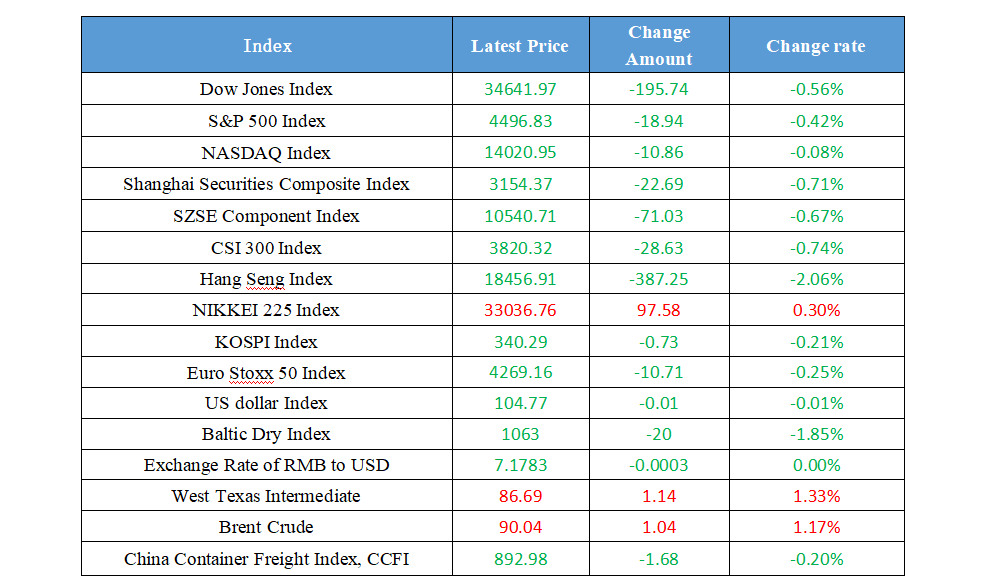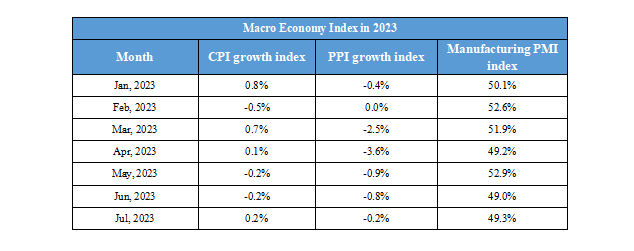September 6th: Global Economic Insights and Policy Updates
Daily Macro Economy News
Latest Global Major Index

International Crude Price Trend and Exchange Rate of RMB to USD Trend

Domestic News
1. Tao Qing, Ministry of Industry and Information Technology: Study and plan further policy measures according to the development of industrial economy
2. The National Healthcare Security Administration has issued a notice clarifying the scope of consumables included in medical insurance payments
3. China has achieved new breakthroughs in deep-sea high-power artificial source electromagnetic detection technology
4. The outlook of the manufacturing industry has improved in August, while the growth momentum of the service industry has slowed down
International News
1. Inflation continues to decline, and the Federal Reserve of Australia remains on hold as scheduled
2. Asian Development Bank: Global trade finance gap reached a record $2.5 trillion
3. The 43rd ASEAN Summit opened
4. Goldman Sachs: The probability of a US economic recession dropping to 15%, and the interest rate cut will not happen soon
Domestic News
1. Tao Qing, Ministry of Industry and Information Technology: Study and plan further policy measures according to the development of industrial economy
The Ministry of Industry and Information Technology held a series of themed press conferences on stabilizing industrial growth. Tao Qing, Director of the Operation Monitoring and Coordination Bureau of the Ministry of Industry and Information Technology, said at the press conference that China's industrial economy is currently in a period of post-epidemic consolidation and recovery. The Ministry of Industry and Information Technology will study and plan further policy measures based on the development of the industrial economy, promote the effective improvement of quality and reasonable growth of quantity in the industrial economy, providing strong support for promoting the overall improvement of economic operation.
2. The National Healthcare Security Administration has issued a notice clarifying the scope of consumables included in medical insurance payments
The National Healthcare Security Administration issued a notice today on the management of medical consumables payment for basic medical insurance. The notice clearly defined the scope of consumables included in medical insurance payments. We need to adapt to the principle of "separating technical labor and material consumption" in the reform of medical service prices, strengthen the connection between medical service price items and medical consumables payment management, and gradually include disposable medical consumables that are not included in the price composition of medical service items in the scope of medical insurance payment management according to regulations. Promote the establishment and improvement of the medical insurance access system of medical consumables. During the "14th Five Year Plan" period, a unified catalog of medical consumables for basic medical insurance in the province (autonomous regions, municipalities directly under the central government) should be formulated in accordance with the access law. Establish and improve a dynamic adjustment mechanism. Timely supplement necessary new technology products, withdraw products that can be better replaced in clinical practice or products that have poor economic evaluation or be listed by relevant departments in the negative list and other products that don’t meet the requirements of medical insurance.
3. China has achieved new breakthroughs in deep-sea high-power artificial source electromagnetic detection technology
Recently, the scientific research team of the South China Sea Institute of Oceanology, Chinese Academy of Sciences, cooperated with the scientific researchers of the China University of Geosciences (Beijing), conducted China's first experiment on the joint detection profile of deep-sea artificial source electromagnetism and geodetic electromagnetism across the ocean mid-ridge at a depth of about 4,000 meters in the central basin of the South China Sea through China's self-developed electromagnetic transmission and receiving equipment. The entire section has a length of nearly 100 kilometers and a total of 16 receiving measurement points, obtaining relatively high-quality electromagnetic data. This experiment marks a further breakthrough in high-power artificial source electromagnetic detection technology in China under complex deep-sea terrain conditions.
4. The outlook of the manufacturing industry has improved in August, while the growth momentum of the service industry has slowed down
In August, the expansion of China's service industry slightly slowed down, and external demand fell into a contraction range for the first time this year. Wang Zhe, a senior economist at Caixin Think Tank, said that the outlook for the manufacturing industry improved in August, the growth momentum of the service industry slowed down, and the downward pressure on the economy remains significant. The problem of insufficient internal demand and weak expectations may form a negative cycle for a longer period of time, coupled with the uncertainty of external demand, and the downward pressure on the economy may continue to increase. Currently, stabilizing expectations and increasing personal income are still the focus of policy implementation. The internal and external economic environment is becoming increasingly complex, and the urgency and necessity of relevant support policies are further increasing.
International News
1. Inflation continues to decline, and the Federal Reserve of Australia remains on hold as scheduled
Due to a slight decline in inflation, the Federal Reserve of Australia has kept interest rates unchanged today and maintained a tightening trend. Continuously suspending interest rate hikes means facing greater obstacles to further rate hikes, and also means that unexpected changes in economic data are needed to promote the Central Bank to further tighten policies. After this decision was made, the Australian dollar has remained almost unchanged. The Federal Reserve of Australia has been slower to raise rates than other central banks, reflecting the rapid transmission of the impact on Australian borrowers who mainly rely on floating rate mortgages. Compared to the Federal Reserve, the Australian Federal Reserve's previous judgment seems to have paid off, and inflation is currently steadily cooling. Economists predict that the CPI will only return to the target of 2-3% by the end of 2025. Lowe acknowledged that the path to a soft landing is "narrow" and reiterated that the Central Bank will make every effort to bring inflation back to its target level. The data released on Wednesday is expected to show a moderate economic growth in the second quarter.
2. Asian Development Bank: Global trade finance gap reached a record $2.5 trillion
According to data from the Asian Development Bank, the global trade financing gap jumped to a record $2.5 trillion last year as economic risks intensified, putting pressure on banks' financing capabilities. According to the 2023 trade financing gap, growth, and employment survey released by the Asian Development Bank on Tuesday, given rising interest rates, weak economic prospects, inflation, and geopolitical turmoil, the trade financing gap has increased by 47% from the $1.7 trillion in 2020. The Asian Development Bank pointed out that approximately 80% of trade relies on some form of financing. The survey respondents stated that they will continue to face restrictions in 2022, with 60% of banks stating that the Russia-Ukraine War has affected trade financing portfolios.
3. The 43rd ASEAN Summit opened
The 43rd ASEAN Summit officially opened on September 5 in Jakarta, the capital of Indonesia, which holds the ASEAN chairmanship now. After the official opening of the summit, ASEAN countries will hold a number of meetings, in addition to a number of bilateral and multilateral meetings between ASEAN and dialogue partners such as China and the United States. The ASEAN Summit will continue to focus on the theme of ASEAN, strive to create a peaceful and stable external environment, deepen cooperation within ASEAN and cooperation of ASEAN and all parties so as to promote common development.
4. Goldman Sachs: The probability of a US economic recession dropping to 15%, and the interest rate cut will not happen soon
Goldman Sachs now believes that the probability of the United States falling into recession is 15%, lower than the previous 20%. The reason is that inflation in the United States is currently cooling, but the labor market is still resilient, indicating that the Federal Reserve may not need to further raise interest rates. Jan Hazous, chief economist at Goldman Sachs, said: "Firstly, against the backdrop of sustained and stable employment growth and rising real wages, it seems that real disposable income in the United States will accelerate again in 2024. Secondly, we still strongly oppose the view that the drag of monetary policy's' ‘long-term variable stagnant’ will push the economy into recession. He believes that the drag caused by policy tightening will continue to weaken and will completely disappear by early 2024. He also predicts that by the end of 2024, the average growth rate of the US economy will reach 2%, and our confidence in the Federal Reserve ending interest rate hikes has increased over the past month. But unless the degree of economic growth slowdown in the coming quarters exceeds our expectations, Federal Reserve officials are unlikely to quickly adopt more accommodative policies. Therefore, we expect the Federal Reserve to only cut interest rates very slowly by 25 basis points per quarter starting from the second quarter of 2024.
Domestic Macro Economy Index














